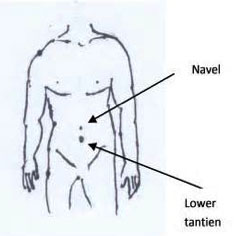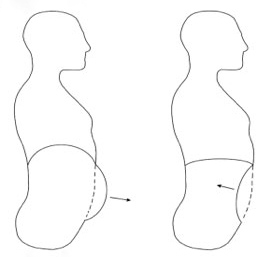Breathing is one of the things we do everyday without thinking, but Taiji & Qigong are different ways of moving & breathing, and it is one of the most difficult things for students to get right. With Taiji one movement feeds off of another, and breathing is a huge part of it. All of my teachers have said not to worry about the correct in & out of it in the beginning of learning & practice because, in reality, moving AND breathing at the same time, all while being aware of both, is quite a challenge. My teachers were right in that eventually it will all come together. In other words, if it feels good just don't think about it that much and keep doing the movements until the magic of it all comes together!

The following exercise will help you to work with Dantien (belly) breathing in order to open your belly and allow your diaphragm to move deeper down into your abdomen on inhalation and farther up to squeeze your lungs and support your heart on exhalation. This will have a powerful influence on your respiration and in the way you breathe during many stressful (and not so stressful) times in your life. It will help to relax your nervous system, harmonize and quiet your thoughts & emotions, and help create a sense of inner stillness & peace.
- Lie down on your back on a comfortable surface such as a bed, carpeted floor, or a yoga mat. Position yourself with your feet flat on the floor & your knees bent (pointing upward). Simply follow and BE AWARE of your normal breathing for a few minutes, and try to sense which parts of your body your breath touches.
- Continue to follow your breathing as you rub your palms together until they are very warm.
- Put your hands (one on top of the other) on your belly, with the center of your lower hand touching your navel. Watch how your breathing responds.
- You may notice that your belly wants to expand as you inhale & retract as you exhale. Let this happen and don’t try to force it.
- If your belly seems tight, rub your hands together again until they are warm and then massage your belly, especially right around the outside edge of your belly button. Notice how your belly begins to soften & relax.
- Now rub your hands together again until they are warm and put them on your belly again. Notice how this influences your breath. Do not try to do anything. Simply watch & enjoy as your belly begins to come to life, expanding as you inhale & retracting as you exhale.
- If your belly still seems overly tight and does not want to move as you breathe, press down with your hands on your belly as you exhale. Then as you inhale, gradually release the tension. Try this several times. Notice how your belly begins to open more on inhalation.

INHALE:
(relaxes & protrudes)
EXHALE:
The belly retracts
(compresses & withdraws)
In deep abdominal breathing, the downward & upward movements of the diaphragm, combined with the outward & inward movements of the belly, ribcage, & lower back, help to massage & detoxify our inner organs, promote blood flow & peristalsis, and pump the lymph more efficiently through our lymphatic system. The lymphatic system, which is an important part of our immune system, has no pump other than muscular movements, including the movements of breathing.
Meditation and controlled breathing go hand-in-hand, but it can be done without the necessary setting for meditation. You can do controlled breathing at any time, while waiting, walking, sitting, watching television, or just before you close your eyes to sleep. You just have to remember to practice during times of opportunity. If you practice this regularly, your normal breathing can be trained to be much slower & deeper, and you will feel more relaxed. Another benefit is that you might notice that your thinking is clearer as well because all of that good oxygen is circulating around your brain!
Breathe ~ You are alive!